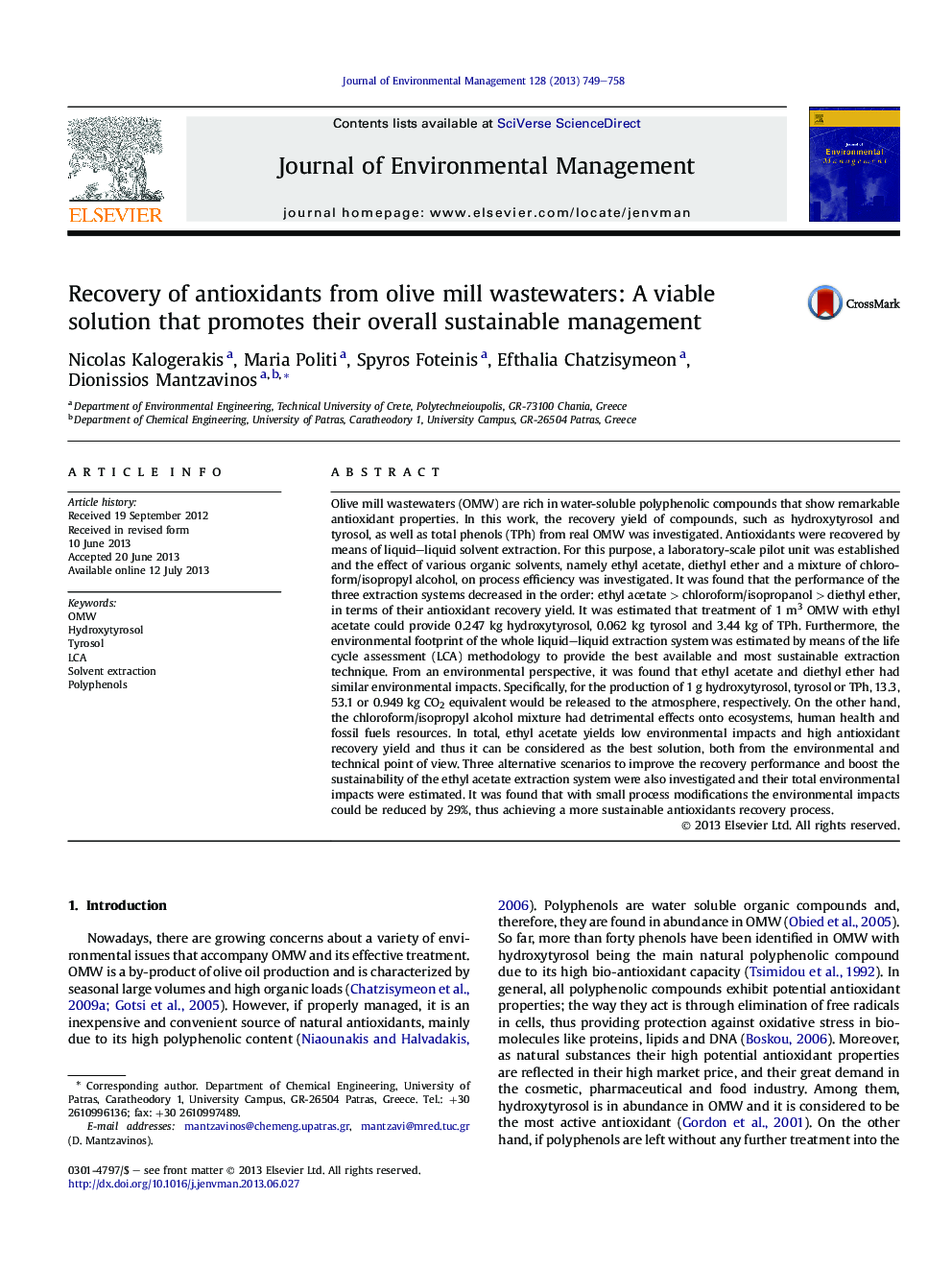| کد مقاله | کد نشریه | سال انتشار | مقاله انگلیسی | نسخه تمام متن |
|---|---|---|---|---|
| 7484472 | 1485284 | 2013 | 10 صفحه PDF | دانلود رایگان |
عنوان انگلیسی مقاله ISI
Recovery of antioxidants from olive mill wastewaters: A viable solution that promotes their overall sustainable management
ترجمه فارسی عنوان
بازیابی آنتی اکسیدان ها از فاضلاب آسیاب زیتون: یک راه حل حیاتی است که باعث مدیریت کلی پایدار آنها می شود
دانلود مقاله + سفارش ترجمه
دانلود مقاله ISI انگلیسی
رایگان برای ایرانیان
کلمات کلیدی
موضوعات مرتبط
مهندسی و علوم پایه
مهندسی انرژی
انرژی های تجدید پذیر، توسعه پایدار و محیط زیست
چکیده انگلیسی
Olive mill wastewaters (OMW) are rich in water-soluble polyphenolic compounds that show remarkable antioxidant properties. In this work, the recovery yield of compounds, such as hydroxytyrosol and tyrosol, as well as total phenols (TPh) from real OMW was investigated. Antioxidants were recovered by means of liquid-liquid solvent extraction. For this purpose, a laboratory-scale pilot unit was established and the effect of various organic solvents, namely ethyl acetate, diethyl ether and a mixture of chloroform/isopropyl alcohol, on process efficiency was investigated. It was found that the performance of the three extraction systems decreased in the order: ethyl acetate > chloroform/isopropanol > diethyl ether, in terms of their antioxidant recovery yield. It was estimated that treatment of 1 m3 OMW with ethyl acetate could provide 0.247 kg hydroxytyrosol, 0.062 kg tyrosol and 3.44 kg of TPh. Furthermore, the environmental footprint of the whole liquid-liquid extraction system was estimated by means of the life cycle assessment (LCA) methodology to provide the best available and most sustainable extraction technique. From an environmental perspective, it was found that ethyl acetate and diethyl ether had similar environmental impacts. Specifically, for the production of 1 g hydroxytyrosol, tyrosol or TPh, 13.3, 53.1 or 0.949 kg CO2 equivalent would be released to the atmosphere, respectively. On the other hand, the chloroform/isopropyl alcohol mixture had detrimental effects onto ecosystems, human health and fossil fuels resources. In total, ethyl acetate yields low environmental impacts and high antioxidant recovery yield and thus it can be considered as the best solution, both from the environmental and technical point of view. Three alternative scenarios to improve the recovery performance and boost the sustainability of the ethyl acetate extraction system were also investigated and their total environmental impacts were estimated. It was found that with small process modifications the environmental impacts could be reduced by 29%, thus achieving a more sustainable antioxidants recovery process.
ناشر
Database: Elsevier - ScienceDirect (ساینس دایرکت)
Journal: Journal of Environmental Management - Volume 128, 15 October 2013, Pages 749-758
Journal: Journal of Environmental Management - Volume 128, 15 October 2013, Pages 749-758
نویسندگان
Nicolas Kalogerakis, Maria Politi, Spyros Foteinis, Efthalia Chatzisymeon, Dionissios Mantzavinos,
